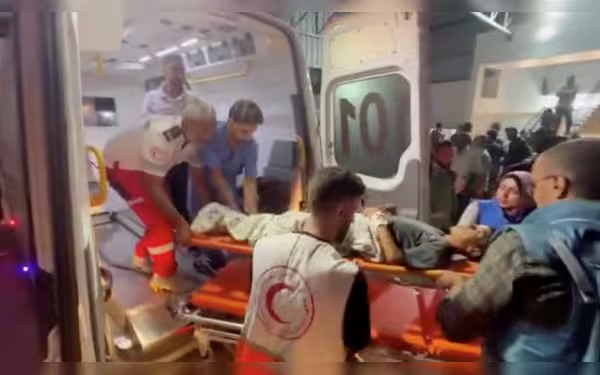Saturday, November 16, 2024 08:26 PM
WHO and Red Crescent Resupply Hospitals in Northern Gaza
- WHO successfully resupplies Kamal Adwan and Al-Sahaba hospitals.
- Critical patients transferred to Al-Shifa amid ongoing conflict.
- Humanitarian efforts face significant challenges in Gaza.
 Image Credits: arabnewspk
Image Credits: arabnewspkWHO and Red Crescent resupply hospitals in northern Gaza, addressing critical healthcare needs amid ongoing conflict.
In a significant development, the World Health Organization (WHO) and the Palestine Red Crescent have successfully resupplied two hospitals in northern Gaza, namely Kamal Adwan and Al-Sahaba. This operation comes after a series of challenges, with WHO chief Tedros Adhanom Ghebreyesus announcing that it took nine attempts over the past week to reach these critical healthcare facilities. The situation in Gaza has been dire, with ongoing hostilities complicating humanitarian efforts.
On social media, Tedros expressed relief at the successful delivery, stating, "WHO and partners finally managed to reach Kamal Adwan and Al-Sahaba hospitals yesterday after 9 attempts this past week." He highlighted the difficulties faced by drivers during the mission, who were subjected to "humiliating security screening" and even faced temporary detention at checkpoints, which he deemed "unacceptable." This reflects the ongoing challenges that humanitarian organizations encounter in delivering aid in conflict zones.
The WHO has consistently criticized the Israeli authorities for the obstacles they impose on supply and patient evacuation missions. During a recent news briefing in Geneva, Tedros emphasized the need for more than just one-off missions, stating, "One-off missions are not enough. There is a sustained need for resupplying hospitals to keep them functioning." He reiterated the call for a ceasefire and for the safety of humanitarian staff, underscoring the urgent need for sustained humanitarian efforts in the region.
As part of the resupply mission, 13 patients in critical condition were transferred from Kamal Adwan hospital to Al-Shifa hospital in Gaza City. Tedros noted that Al-Shifa is currently overwhelmed, serving around 60 in-patients and receiving 50 to 70 injured individuals daily. Additionally, six other patients who had been transferred earlier from Al-Awda Hospital to Kamal Adwan were also moved to Al-Shifa, along with their companions.
The resupply operation was not limited to patients; it also included the delivery of essential resources. A total of 20,000 liters (5,300 gallons) of fuel were provided to keep Kamal Adwan and Al-Awda operational, while Al-Sahaba Hospital received 23,000 liters of fuel, along with 800 units of blood and vital medicines and supplies. This fuel is crucial for running the hospitals' generators, ensuring that they have a reliable power supply.
The healthcare infrastructure in Gaza has been severely impacted by the ongoing conflict, with many facilities suffering damage from shelling and fighting. The Israeli military has accused Hamas, which governs the Gaza Strip, of using hospitals as shields during the conflict, complicating the situation further. This has led to increased scrutiny and challenges for humanitarian organizations trying to provide aid.
The successful resupply of hospitals in northern Gaza highlights the critical need for ongoing humanitarian assistance in the region. As the conflict continues, the importance of ensuring that healthcare facilities remain operational cannot be overstated. The international community must work together to facilitate safe and sustained humanitarian missions, ensuring that those in need receive the care and support they deserve.













